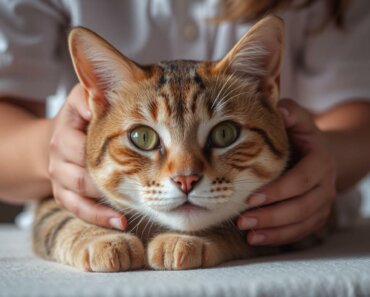7. Nasal Polyps or Tumors
Though rare, nasal polyps (benign growths) or cancerous tumors can cause chronic sneezing and nasal discharge.
Symptoms may include:
- Noisy breathing
- Loss of smell
- Reduced appetite
- Persistent nasal drainage (often from one nostril)
Your veterinarian may recommend imaging (X-rays or CT scans) to identify the cause.
🏠 Home Care & Remedies for Sneezing Cats
If your cat is otherwise healthy and active, and sneezing only occasionally, home care may be enough.
Here are a few steps you can take:
1. Humidify the Air
Dry indoor air can irritate nasal passages. Use a cool mist humidifier to ease breathing, especially during winter months.
2. Keep the Environment Clean
Vacuum regularly, switch to low-dust litter, and avoid chemical cleaners or scented products.
3. Hydration & Nutrition
Encourage water intake. Consider a cat fountain to make drinking more appealing.
Feed a high-quality, balanced diet to support immune health.
4. Boost Immunity
Supplements like L-lysine may help cats prone to herpesvirus flare-ups (ask your vet before starting).
5. Reduce Stress
Stress can trigger viral flare-ups. Maintain a calm, predictable environment with safe hiding spots and regular playtime.
⚠️ When to See the Vet
You should call your veterinarian if your cat:
- Sneezes multiple times daily for more than 3–5 days
- Has discolored nasal discharge (yellow, green, or bloody)
- Shows labored breathing or wheezing
- Stops eating or drinking
- Has swollen eyes or mouth ulcers
Persistent or worsening symptoms can indicate infection or another underlying issue that requires treatment.
🧠 Preventing Sneezing in Cats
While you can’t prevent every sneeze, you can minimize risks:
- Keep vaccines up to date – especially for FHV and FCV.
- Maintain clean litter boxes and living areas.
- Isolate new or sick cats before introducing them to others.
- Provide regular dental checkups and professional cleanings.
- Avoid smoke, perfume, and aerosol sprays around your cat.
❓ Frequently Asked Questions
1. Can cats catch colds from humans?
No. Feline colds are caused by viruses that don’t affect humans. However, cats can spread URIs to one another.
2. Should I use human cold medicine for my cat?
Never. Many human medications are toxic to cats. Always consult your vet before giving any over-the-counter remedies.
3. My cat sneezes when using the litter box. Is that normal?
Yes, if it’s an occasional reaction to litter dust. If it happens constantly, try switching to a low-dust or natural litter.
4. Can allergies cause chronic sneezing?
Absolutely. Cats can develop seasonal or environmental allergies just like people, especially to pollen or household dust.
5. How do I know if my cat’s sneezing is serious?
If sneezing is persistent, accompanied by discharge, lethargy, or appetite loss, schedule a vet visit immediately.
🩺 Final Thoughts
Occasional sneezes are no big deal, but frequent sneezing is your cat’s way of saying something’s wrong.
By paying attention to patterns, keeping your cat’s environment clean, and seeking veterinary care when needed, you can help your feline breathe easier and stay healthy.
A sneeze may seem small, but it can tell you a lot about your cat’s overall well-being.






